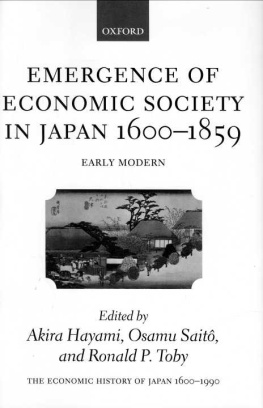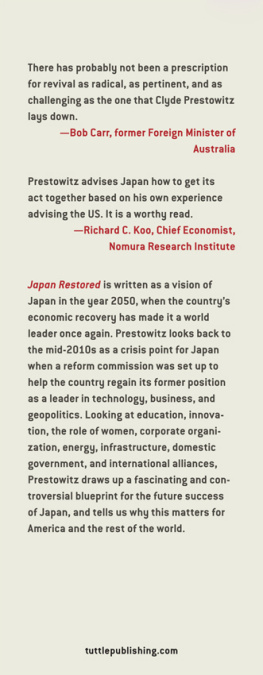
An East Gate Book
An East Gate Book
First published 1998 by M.E. Sharpe
Published 2015 by Routledge
2 Park Square, Milton Park, Abingdon, Oxon OX14 4RN
711 Third Avenue, New York, NY 10017, USA
Routledge is an imprint of the Taylor & Francis Group, an informa business
Copyright 1998 Taylor & Francis. All rights reserved.
No part of this book may be reprinted or reproduced or utilised in any form or by any electronic, mechanical, or other means, now known or hereafter invented, including photocopying and recording, or in any information storage or retrieval system, without permission in writing from the publishers.
Notices
No responsibility is assumed by the publisher for any injury and/or damage to persons or property as a matter of products liability, negligence or otherwise, or from any use of operation of any methods, products, instructions or ideas contained in the material herein.
Practitioners and researchers must always rely on their own experience and knowledge in evaluating and using any information, methods, compounds, or experiments described herein. In using such information or methods they should be mindful of their own safety and the safety of others, including parties for whom they have a professional responsibility.
Product or corporate names may be trademarks or registered trademarks, and
are used only for identification and explanation without intent to infringe.
Prior Publication: Some material in this book was previously published in
Japan Economic Studies, MarchApril 1996, and the Washington Quarterly,
Vol. 20, No. 2, Spring 1997
Library of Congress Cataloging-in-Publication Data
Katz, Richard, 1951
Japan: the system that souredthe rise and fall of the Japanese
economic miracle / Richard Katz.
p. cm.
An east gate book.
Includes bibliographical references and index.
ISBN 0-7656-0309-8 (cloth: alk. paper).
ISBN 0-7656-0310-1 (pbk.: alk. paper)
1. JapanCommercial policy. 2. Industrial policyJapan.
3. JapanEconomic conditions1989 I. Title.HF1601.K29 1998
338.952DC21 98-11091
CIP
ISBN 13: 9780765603104 (pbk)
ISBN 13: 9780765603098 (hbk)
To Linda and Laura

Contents

Without the help and encouragement of many people in the U.S. and Japan, this book could not have been written.
There is scarcely a major idea in this book that I have not talked over with my friend and journalistic colleague Peter Ennis, the U.S. correspondent for the Japanese business magazine Toyo Keizai and the editor-in-chief of its English-language publication, The Oriental Economist Report. Peter and I have been talking about Japan for nearly a quarter of a century. If not for him, the ideas in this book would have been less clear, less accurate, and less interesting.
At a key point in my work, I received sage advice from Daniel Sneider, another friend and journalistic colleague. Dan is a former Tokyo correspondent for the Christian Science Monitor. Without his advice, the research project that led to this book might never have been undertaken.
Many people gave support and encouragement along the way, but the following individuals provided special assistance that helped the ideas in this book see the light of day: Kent Calder, Merit Janow, Takao Toshikawa, Yuji Aso, Wakako Otsubo, Takashi Kiuchi, James Kilpatrick, and Motoya Kitamura.
Several people from the assorted analytical camps surrounding Japan-related issues, as well as some other individuals, read various parts of the manuscript and offered comments, criticism and suggestions. They include: Walter Hatch, Ira Wolf, Clyde Prestowitz, Hugh Patrick, David Asher, Edwin Marks, and Peter Rush.
Meanwhile, the Japan Economic Seminar, a quarterly gathering of economists, provided me with the opportunity to get professional feedback on the thesis of this book. The Seminars leaders are: Professors James Nakamura, Hugh Patrick, Kazuo Sato (who took the trouble to write a long critique), and, at the time, Fumio Hayashi. The discussant for the paper was Sumiye Okubo.
The original research for this book came out of work for my Masters Degree in Economics at New York University. My thanks to my readers, Professors Bernard Wasow and Edward Wolff, and the departmental secretary, Marjorie Lesser.
At JETRO New York, Hiro Sato and Katsuhiko Masubuchi, tirelessly located critical data for me. The same is true of Tonya Kemp and some of the other staff at the Japan Economic Institute in Washington, DC, as well as Mali Quintana at the New York Office of Deutsche Morgan Grenfell. I thank them all wholeheartedly.
My thanks to all who provided feedback and assistance. As usual, the help people gave me should not be taken to imply endorsement of my views. Any errors of fact or judgment are my sole responsibility.
At M.E. Sharpe, editor Doug Merwin was very supportive. He readily endorsed the unusual notion of a crossover book that would address a general audience in the main section and have more technical appendices in the back for textbook use. He also made sure the book would get out quickly enough to address a rapidly changing situation. In Angela Piliouras I was given a production editor who worked harder and was more tolerant of all my changes and updates than I had any right to expect.
None of the words in this book have been as hard to find as ones sufficient to express my infinite gratitude to my wife, Linda, and my daughter, Laura, who turned 3 years old while this book was being written. Linda has been my partner, adviser and confidante throughout this project. She took on far more than her share of household and parental responsibilities, and delayed some of her own work-related projects, in order to give me time to write. Laura exhibited unbelievable patience with my inability to play with her as much as I used to, and she kept reassuring me that, The publisher will say its a beautiful book. This book is dedicated to them.


The ideas of economists and political philosophers, both when they are right and when they are wrong, are more powerful than is commonly understood. Indeed the world is ruled by little else. Practical men, who believe themselves to be quite exempt from any intellectual influences, are usually the slaves of some defunct economist. Madmen in authority, who hear voices in the air, are distilling their frenzy from some academic scribbler of a few years back. Soon or late, it is ideas, not vested interests, which are dangerous for good or evil.
John Maynard Keynes, 1936
If Japan fails to end industrial policy, its postwar developmentalism may be judged a failure











 Contents
Contents